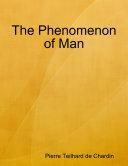Quotes from book
The Phenomenon of Man

Pierre Teilhard De Chardin
Original title
Le Phénomène Humain
(French, 1955)
The Phenomenon of Man is an essay by the French philosopher, paleontologist and Jesuit priest Pierre Teilhard de Chardin.

The Phenomenon of Man (1955)
Context: If there were no internal propensity to unite, even at a prodigiously rudimentary level — indeed in the molecule itself — it would be physically impossible for love to appear higher up, with us, in hominized form.... Driven by the forces of love, the fragments of the world seek each other so that the world may come into being.